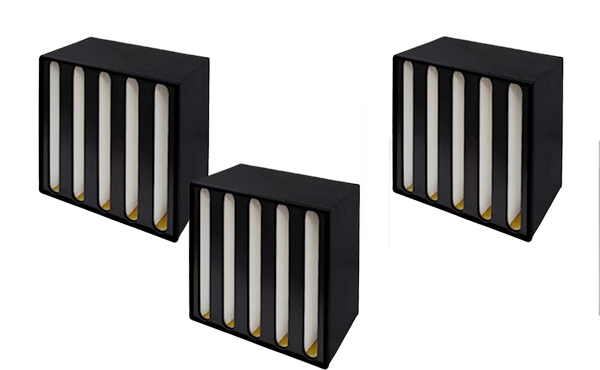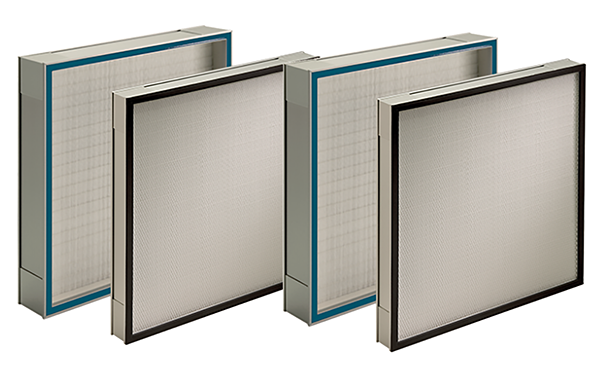Ryan Berkley, CAFS, is president of B&B Filters. As a certified air filter specialist by the National Air Filtration Association (NAFA), Ryan’s completed extensive training and testing in the field of air filtration and has a thorough understanding of air filtration principles, technologies and practices. This high level of filter expertise allows Ryan to provide school districts, universities, hospitals, manufacturers, laboratories, research facilities and others customized, quality solutions to their air filtration needs.
Breathing Easy: Exploring the Diverse Applications of Advanced Filtration Systems

Breathing in clean, pure air is fundamental to our well-being. While inside buildings, we rely on advanced filtration systems to provide clean, quality air.
From high efficiency filtration solutions to UV-C systems, today's filtration technology has evolved to meet the diverse needs of various industries. These systems not only provide air purification but also include fluid filters and industrial filters designed for contamination control in sensitive environments.
The benefits of using quality advanced filtration systems extend beyond mere environmental protection. They also offer improved air quality, particle removal, and overall better health.
Industrial applications particularly benefit from these technologies. When solutions are tailored to specific industry needs, it helps ensure safety and efficiency in operations.
As we continue to innovate in this field, clean air solutions are proving to be indispensable across a myriad of settings, showcasing the importance of filtration performance and its impact on everyday life.
Introduction to Advanced Filtration Systems
Tracing its evolution from the ancient practice of using cloth for water filtration, advanced filtration systems have come a long way.
Today, these systems incorporate state-of-the-art technologies like UV-C systems and high efficiency air filters, tailored for a wide array of uses. Modern filtration equipment is designed to improve air quality, offering filtration solutions ranging from industrial filters to indoor air purifiers. The inclusion of advanced filtration technology in various sectors shows how vital these systems are for both environmental protection and human health.
With the rise of air pollution and the increasing need for contamination control, innovations in filtration systems have proven to be indispensable. Filtration solutions for industries now include fluid filters and air purification systems, which play a crucial role in industrial applications by ensuring cleaner air and fluids. These purification solutions not only contribute to environmental protection but also enhance filtration efficiency, significantly improving air quality control in both business and residential settings.
The trend towards cleaner technologies is evident in the growing adoption of UV-C filtration and other clean air technologies, making advanced filtration systems a fundamental part of modern life.
Healthcare Applications of Advanced Filtration
Advanced filtration systems have become an integral part of healthcare, ensuring a sterile and safe environment. This should be of particular interest to areas like Johnson City, TN where there’s a higher concentration of hospitals who can benefit from a local air filter provider.
Air filtration and UV-C systems are employed in hospitals to reduce airborne contaminants and maintain air quality control. These technologies are critical in operating rooms and intensive care units, providing high efficiency filtration to prevent infections and contamination. As a result, patient outcomes and overall healthcare environments have significantly improved.
In the battle against hospital acquired infections, fluid filters and other filtration equipment play a crucial role. These systems help in the elimination of harmful pathogens, ensuring that both air and fluid entering patient areas are clean and uncontaminated. The implementation of industrial filters and particle removal technologies in healthcare settings is essential to maintain strict hygiene standards. This contributes to better health and safety for both patients and healthcare workers.
Studies indicate that the use of advanced filtration in healthcare facilities can reduce airborne infections by up to 50%. This statistic underscores the importance of filtration innovation in creating safer hospital environments. By integrating air purification systems and clean air solutions, healthcare providers can achieve significant reductions in infection rates and enhance overall patient care.
Filtration solutions for businesses in the healthcare sector have led to increased filtration efficiency and improved air quality in medical settings. The benefits extend beyond patient health, also providing environmental protection and contributing to overall public health. The trend towards advanced clean air technologies showcases the ongoing commitment to ensuring safer and healthier environments in hospitals and other healthcare facilities.
Industrial and Environmental Uses of Filtration Systems
In industrial and environmental settings, advanced filtration systems provide crucial benefits for both operational efficiency and environmental protection. Filtration solutions for industries include a vast array of systems designed to tackle specific challenges, from managing air quality to controlling fluid contaminants. High efficiency filtration and industrial filters help in maintaining clean air and ensuring that industrial processes run smoothly without contamination issues.
For example, in the petroleum industry, fluid filters are used extensively to remove particulate matter and other impurities from crude oil and its by-products. This purification solution ensures that the end products meet stringent quality standards while also protecting machinery from abrasive damage. The use of industrial filters in this context not only improves the quality of the output but also extends the lifespan of expensive equipment, showcasing significant industry benefits.
Another critical aspect is air filtration in manufacturing plants, where airborne contaminants can jeopardize both product quality and worker health. Advanced filtration technology is employed to capture and remove particles, gasses, and other pollutants from the air — leading to improved air quality within these facilities. UV-C systems are often incorporated as part of these clean air solutions to enhance air purification and ensure that microbial contamination is kept at bay.
Environmental protection is another significant advantage of modern filtration systems.
By removing pollutants and contaminants from industrial emissions, these systems help reduce the impact of industrial activities on surrounding ecosystems. Filtration equipment plays a vital role in air quality control and environmental conservation, demonstrating how improved filtration efficiency can contribute to a cleaner and healthier planet.
Industrial applications of advanced filtration also extend to sectors like wastewater treatment, where filtration innovation is key to removing harmful substances from water before it is discharged back into the environment. These solutions not only protect natural water sources but also support regulatory compliance and public health objectives. The ongoing developments in clean air technologies and filtration systems underscore their essential role in promoting sustainability and industrial cleanliness.
Advanced Filtration in Consumer Products
In today's world, ensuring clean air and water in our homes is more critical than ever. One of the challenges in achieving this is efficiently removing pollutants and allergens from indoor environments. This issue can be addressed through the use of advanced air filtration systems, such as UV-C filtration and indoor air purifiers. These technologies offer high efficiency filtration to capture airborne particles, improving indoor air quality and contributing to better respiratory health for our families.
Another common challenge in consumer products is the contamination control of drinking water. Many households face issues with impurities and harmful substances in their tap water. Advanced filtration technology, including fluid filters and purification solutions, can effectively address this problem by removing contaminants and ensuring safe, clean water for consumption. The adoption of these filtration systems in consumer products demonstrates a commitment to environmental protection and health, showcasing industry benefits that enhance everyday life.
Emerging Trends in Filtration Technology
Emerging trends in filtration technology are transforming the landscape of air and water purification. Advanced filtration equipment, such as UV-C filtration and high efficiency air filters, are becoming increasingly popular due to their ability to effectively remove pollutants and improve air quality. These developments reflect the growing demand for cleaner environments both in industrial settings and consumer products, showcasing the industry benefits of continuous innovation.
Comparing traditional filters versus advanced UV-C systems reveals significant advancements in filtration efficiency and contaminant removal. UV-C systems, for instance, use ultraviolet light to destroy microbial contaminants, offering a deeper level of purification than conventional filters. This method is particularly effective in industrial applications where contamination control is critical, providing cleaner air solutions and enhancing overall filtration performance.
Another noteworthy trend is the integration of smart technologies with filtration systems. Indoor air purifiers and purification solutions are now being equipped with sensors and connectivity features that allow for real time monitoring and adjustments. This innovation not only provides better air quality control but also ensures that the filtration systems operate at optimal efficiency. As we embrace these technological advancements, the future of clean air technologies and environmental protection looks promising.
Challenges and Considerations in Filtration System Design
How does the complexity of filtration systems impact their design and effectiveness? Designing advanced filtration systems is no small feat, given the multitude of considerations involved. Filtration efficiency is a crucial factor, as it determines how effectively a filter can remove particles and contaminants. When choosing high efficiency filtration solutions, one must balance performance with cost and suitability for specific industrial applications. Filtration equipment must not only meet purification needs but also be sustainable and economically viable.
A significant challenge in filtration system design is contamination control. Industrial filters, UV-C systems, and fluid filters must be meticulously designed to ensure optimal contamination removal. Any shortcomings can lead to compromised air quality control and reduced filtration performance. This is particularly true in industries where maintaining sterility is mission critical, such as healthcare and pharmaceuticals. Various purification solutions need to be integrated seamlessly to offer comprehensive clean air solutions.
Another consideration is the environmental impact of filtration systems. Many modern systems aim for environmental protection by using sustainable materials and energy efficient technologies. Advanced filtration technology that prioritizes reduced resource use and lower emissions is vital for the industry's image and operational effectiveness. Design choices should reflect a balance between robust filtration benefits and minimized environmental footprint.
The evolving regulatory landscape also plays a significant role. Compliance with stringent guidelines often demands innovative filtration solutions that not only meet current standards but are also adaptable to future regulations. This requires ongoing filtration innovation and keeping abreast of filtration industry trends. For businesses, failing to meet regulatory requirements can result in operational disruptions and financial penalties, making it crucial to invest in filtration systems that offer performance and compliance.
Finally, the adaptability of filtration systems is a crucial aspect of design. Industries evolve, and so do their unique needs for air and fluid filtration. Systems must be flexible enough to handle varying levels of contaminants and particulate loads while maintaining high filtration performance. This versatility ensures that filtration solutions can be effectively deployed in a range of environments, from large industrial settings to single purpose facilities, ultimately leading to improved air quality and cleaner working conditions.
Understanding the applications of high efficiency filtration solutions to UV-C systems can help businesses from Nashville to Atlanta to Johnson City and elsewhere make informed decisions about their air filtration systems.
If you have questions about your air and water filtration challenges — whether it’s finding customized air filter solutions, faster delivery, or more cost-effective options — please call (423)-775-2932 or email us.
Share
Similar Posts










